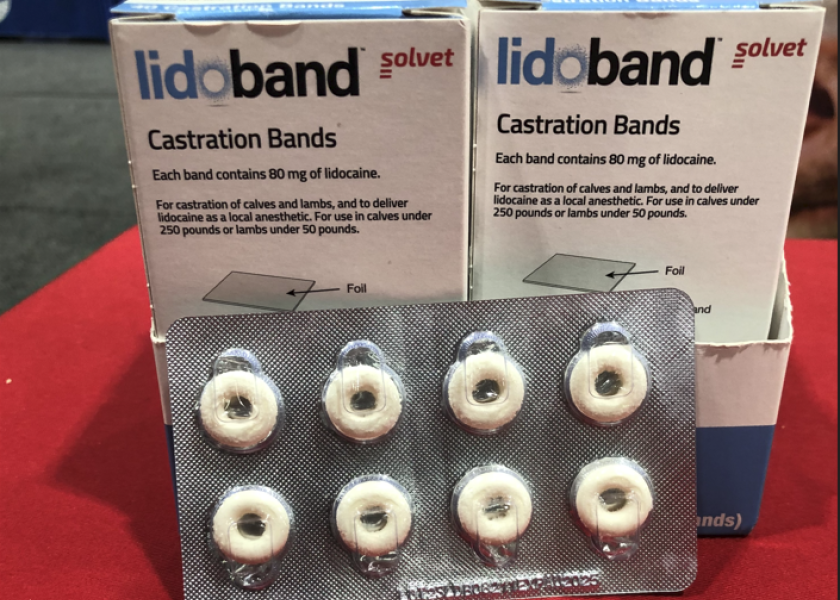New Lidocaine-Infused Band Reduces Castration Pain, Discomfort

The use of heavy, elastic bands for castration is a practice long employed in the production and management of beef and dairy calves and lambs.
Now, an innovative tool called Lidoband is available to help veterinarians, livestock producers and managers in the United States and Canada address the need for castration while significantly reducing any associated pain and discomfort in the process.
Lidoband, from Solvet, is a novel, lidocaine-impregnated latex band approved for use in calves under 250 pounds and in lambs under 50 pounds.
The new, one-step tool is helping revolutionize what is a standard castration practice in the livestock industry, says Steve Schram, a pharmaceuticals marketing executive and spokesman for the company.
“This is a groundbreaking tool that’s helping veterinarians and producers address an unmet need, both current and future animal welfare requirements, while keeping calves and lambs safe and healthy in the process,” Schram says.
Long-Term Pain Relief
Castration, a common practice in the livestock industry, is a necessary management practice to control reproduction, manage animal temperament and behavior, improve meat quality and ensure proper herd management.
In the process, Lidoband provides a local, soothing anesthesia to the application area, according to Lionel Gibbs, Solvet chief executive officer.
“Each band is infused with 80 milligrams of lidocaine and stops the pain and discomfort associated with banding,” Gibbs says. “It's a slow-release product that doesn’t go systemic; it stays in the local tissue and works for up to 42 days.”
The length of pain relief provided to the animal is critical. The banded castration process in beef and dairy calves, for example, commonly requires three to six weeks before the testes are sloughed off. In the United States alone, an estimated 15 million bovine castration procedures are performed each year.1
“Along with reducing pain, a benefit of using Lidoband is the area around the scrotum stays very clean. There’s no flaky, scabby problem, and that’s a valuable byproduct of using it,” Gibbs adds.
Animal Well-Being Benefits
Schram notes that Lidoband is revolutionary in addressing the long-time unmet need to reduce the pain associated with castration by banding, as the only pain-relief options available until now were to use an oral or injectable product.
“Addressing and eliminating pain are the right things to do, and this is a tool veterinarians can use to educate producers who were unaware or knew little about the pain associated with the practice of banding,” he says.
Lidoband is available for purchase over-the-counter through traditional distribution channels, including various farm supply stores.
Schram says there is little to no need to come into contact with the product during application as each band is individually packaged in a foil-sealed blister and can be used with most commercial elastrator applicators (not included).
“But as a standard precaution the company recommends using latex gloves during administration,” he adds.
Looking ahead, Gibbs says Solvet is finalizing the development of a new version of Lidoband that will be suited for use with larger animals in the livestock industry.
Sources
1. Coetzee J.F., Nutsch A.L., Barbur L.A., Bradburn R.M. A survey of castration methods and associated livestock management practices performed by bovine veterinarians in the United States. BMC Vet. Res. 2010;6:12. doi: 10.1186/1746-6148-6-12.







